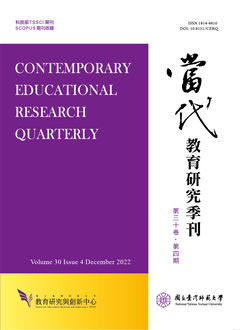

研究目的
本研究旨在探討臺灣地區新住民家庭社經地位對子女語言發展的影響,並進一步探究新住民母親華語能力與親子共讀時間的中介效果。
研究設計/方法/取徑
研究資料取自臺灣幼兒發展調查資料庫建置計畫(簡稱KIT),36月齡組第三波(5歲)之原始數據。研究樣本係以2013年4月1日至2014年3月31日出生,主要照顧者為新住民母親之幼兒,共計127名,以中介效果模型進行次級資料分析。
研究發現或結論
1. 5歲新住民子女語言發展較本國籍僅輕微落後,其中以中港澳新住民子女語言發展較優於東南亞。新住民母親華語能力以讀、寫面向表現較弱,尤其東南亞籍母親讀、寫能力介於稍弱至尚可之間,且能力顯著低於中港澳籍母親。親子共讀方面,七成新住民家庭有進行共讀,其中超過四成家庭每週共讀1~3次,超過三成家庭數週才會進行1次,一週內總共讀時間約32.8分鐘。
2. 新住民母親華語能力在家庭社經地位與子女語言發展間具有完全中介效果。
3. 新住民親子共讀時間在家庭社經地位與子女語言發展間具有完全中介效果。
4. 新住民母親華語能力顯著影響親子共讀時間。母親的華語能力和親子共讀時間,在家庭社經地位與子女語言發展間具有顯著的遠程中介效果。
研究原創性/價值
1. 目前新住民語言發展相關研究結果有所歧異。研究指出學齡前新住民子女語言發展較本國籍子女落後,但兩者在進入小學後,語言發展差距縮小,表示學校教育對幼兒語言發展的價值。近年來教育部推動「5歲幼兒免學費」政策,教育部表示全臺5歲幼兒入園率已達96%,學前教育接近普及化。本研究針對5歲幼兒進行探究,有助了解在高入園率,教育資源挹注下,新住民子女學齡前的語言發展情形。
2. 過去相關研究多從單一面向分析,如家庭社經地位、照顧者的言談、共讀活動,對新住民子女語言發展的影響。基於影響幼兒語言發展的因素多元,本研究中介模型有助釐清影響新住民子女語言發展的機制。
教育政策建議或實務意涵
目前各縣轄市家庭教育中心、公立圖書館或民間新住民社群團體常開設生活適應、親職增能的工作坊或課程,主要目的為提升新住民華語能力,以適應異地家庭生活。而本研究具體指出新住民母親華語能力及親子共讀,對於新住民子女語言發展有關鍵影響。此結果有益於新住民實務課程上,以親子共讀方案作為提升新住民家庭親子雙方華語能力的可行性。
Purpose
This study aimed to investigate the impact of the socio-economic status (SES) of new immigrant families in Taiwan on the language development of new immigrant children. The mediating effects of the Chinese language ability of new immigrant mothers and the time spent on parent-child reading were further explored.
Design/methodology/approach
The third wave original data (five years old) of the 36-month-old group in the Kids in Taiwan: National Longitudinal Study of Child Development and Care (KIT) were used in this study. A total of 127 children born between April 1, 2013 and March 31, 2014, whose primary caregivers were new immigrant mothers, were recruited as the research subjects. Subsequently, the mediating effect model was adopted for the secondary data analysis.
Findings/results
1.The language development of five-year-old new immigrant children was slightly below than that of the children whose parents were
from Taiwan. Among the former, the language development of new immigrant children from Mainland China, Hong Kong, and Macao was better than that of the new immigrant children from Southeast Asia. In terms of Chinese language ability, new immigrant mothers generally performed poorly in reading and writing. In particular, Southeast Asian mothers’ reading and writing abilities ranged between slightly weak to acceptable and were substantially worse than those of the mothers coming from Mainland China, Hong Kong, and Macao. In terms of parent-child reading, 70% of the immigrant families studied spent time performing this activity. Among them, over 40% of the families engaged in parent-child reading one to three times per week, whereas 30% of them participated in such activities once per week. The average parent-child reading time per week was approximately 32.8 minutes.
2.The Chinese language ability of new immigrant mothers had a complete mediating effect between family SES and the language development of new immigrant children.
3.Similarly, the time spent on parent-child reading had a complete mediating effect between family SES and the language development of new immigrant children.
4.The Chinese language ability of new immigrant mothers significantly influenced the time spent on parent-child reading. In addition, these two factors together had a complete mediating effect between family SES and the language development of new immigrant children.
Originality/value
1.At present, research on the language development of new immigrant children has not reached a consensus. Previous studies indicated that while the language development of new immigrant preschool children was behind that of the children whose parents were from Taiwan, the gap between them narrowed after both the groups of children were enrolled in elementary schools, thus demonstrating the value of school education in children’s language development. Since the implementation of the “Free education for five-year-old children” policy by the Ministry of Education in recent years, the school enrollment rate for five-year-old children has reached 96% in Taiwan, indicating the universalization of preschool education. Considering the current high enrollment rate and provision of sufficient educational resources, we investigated the language development of five-year-old immigrant preschoolers.
2.Previous related studies have predominantly analyzed the effect of a single factor, such as family SES, caregiver’s speech, and parent- child reading activities on the language development of children. Due to the influence of multiple factors, a mediating effect model was introduced in this study to clarify the impact of different factors on the language development of new immigrant children.
Suggestions/implications
At present, family education centers, public libraries, and unofficial immigrant community groups in counties and cities across Taiwan offer new immigrant life adaption and parental empowerment workshops and courses to improve their Chinese language ability and help them adjust to the new environment. The findings of this study specifically indicate that the Chinese language ability of new immigrant mothers as well as the time spent on parent-child reading produced significant effects on the language development of their children. Therefore, this study has clearly shown the feasibility of introducing parent-child reading activities to the existing practical courses for new immigrants to improve the Chinese language ability of both the parents and children coming from new immigrant families.

本著作係採用創用 CC 姓名標示-非商業性 3.0 台灣 授權條款授權.
本刊國立台灣師範大學教育研究與創新中心
106台北市和平東路一段162號 | 電話: 02-7749-3670 | E-mail: cerecerq@gmail.com
教創中心 | 師大 | 電子報 | 線上投審系統
本刊由國家科學及技術委員會人文社會科學研究中心補助經費
© 2014 CERI-NTNU
